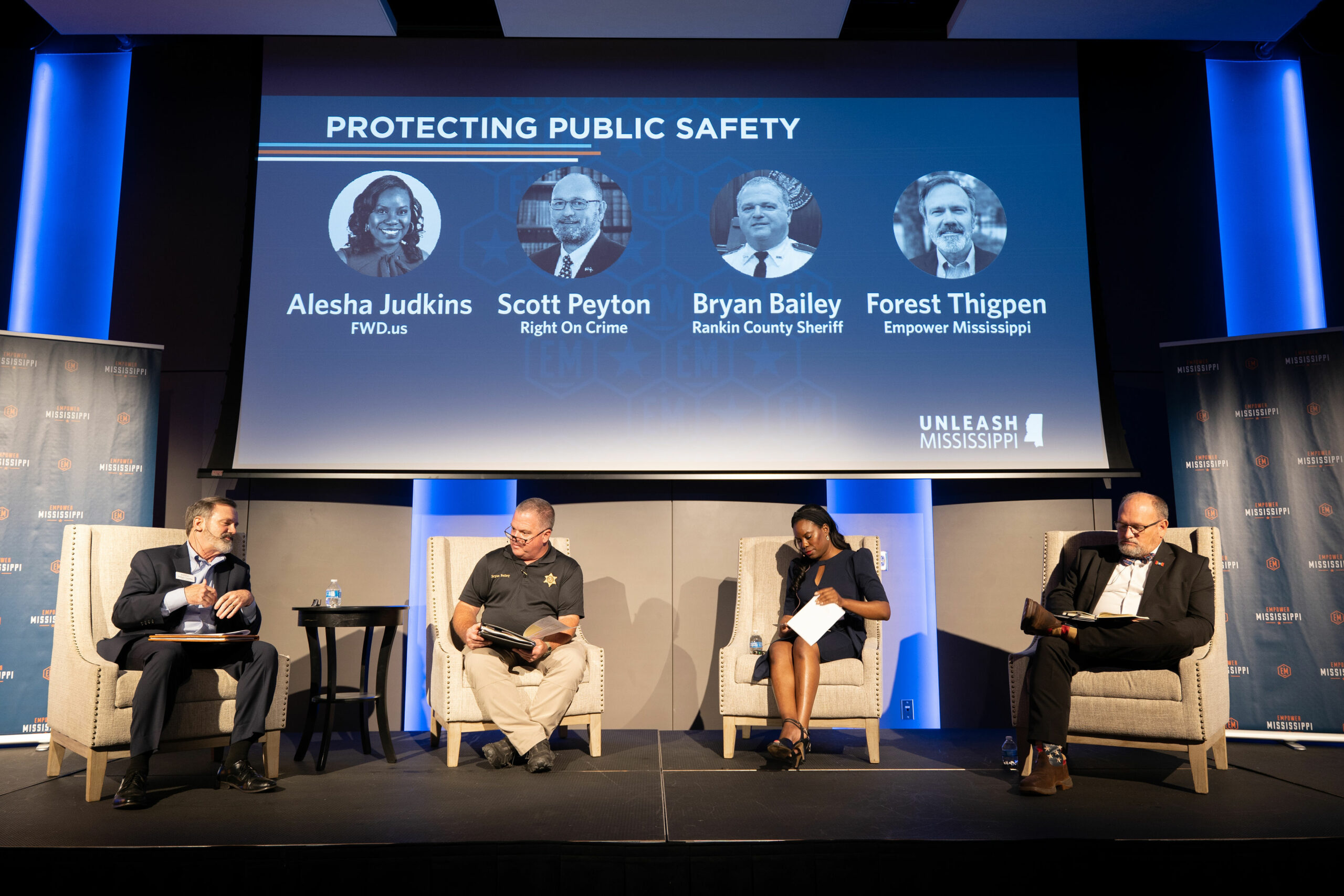Protecting public safety and providing second chances

At Unleash Mississippi, a panel focused on protecting public safety and providing second chances talked about what we can do to keep our communities safe while ensuring those who leave prison after prepared for life when they are released.
Panelists included Alesha Judkins of FWD.us, Scott Peyton of Right on Crime, and Rankin County Sheriff Bryan Bailey.
Below are some of their comments from the discussion.
Sheriff Bailey:
“I was the first one to say let’s lock them up and throw away the key, let’s go get some more and put them in jail. But God opened my eyes and said I was wrong.
“In God’s eyes, our sin is the same. I built up relationships and learned who the person was behind that striped suit. God laid it on my heart that it was my job to help these people. We’re not being soft on crime. We’re being smart on crime
“It costs me $66 a day to house an inmate. I have 500 inmates right now. If I can keep 100 from coming back to jail, look at the savings for the taxpayers. Even if you take out trying to do the right thing for people, financially it’s the smart thing to do.”
“About 50 percent will return to jail if we’re not providing them the tools they need, if it’s a bad family environment, but that’s 50 percent who will make it and we need to pour into them
“There are small little life skills that we fail to provide. If we keep doing what we’ve been doing, lock them up and let them do the time and put them back on the street with no new skills, training, and no way to win, they’re going to be right back in.
“The biggest problem with what we’re trying to do here is mind for gold. Figure out who is worth saving and who doesn’t really care to be saved. Who is the person that wants to be lifted up because everyone isn’t going to make it. We have to filter out who really wants to do this because people in Rankin county want to be safe.
“It breaks my heart with the people who don’t make it.”
Alesha Judkins:
“We are not the sum of our worst mistakes. Life circumstances fold out in certain ways, people make poor choices, but that doesn’t mean they’re a bad person.
“When you pour into people, give them the tools and support they need, we can restore hope. People tend to make bad choices when they don’t think they have another option. It’s our job to restore that hope.
“In Mississippi, we tend to lock people up for longer and more harsh sentences, whether it’s violent or non-violent. We’re far above the national average. In a lot of people’s minds, we equate prison and public safety. But more than 25 states have been able to drive down their rate of imprisonment and drive down their crimes rates. The two can happen at the same time. Mississippi is on the right track to do that.
“One in five people in prison in Mississippi are in prison for a drug offense. That doesn’t mean they’re getting help with their addiction or the tools or resources they need to battle their addiction. So, it doesn’t mean our community is being made safer by locking them up for such a long period of time.
“In Mississippi, we spend around $360 million per year on our prison system. How else could we reinvest that money?
“You will need a lot of help and support after serving 20, 30, 40 years in prison. It’s things you and I may take for granted like going to the grocery store can be an overwhelming experience. People who went in as kids are now getting out, that’s a lot to think through. A lot of support needs to be put in place for the first two months so they can through those trip hazards. We can make sure those supports are in place. Making sure people have access to education and gainful employment opportunities.
“When people have the support they need, they’ll surprise you.
“We can reduce our prison population, save the taxpayer expense, build stronger families and communities, and keep us safe at the same time.”
Scott Peyton:
“Re-entry provides hope.”
– @ScottEPeyton1, @RightOnCrime pic.twitter.com/32jwhWt0ye
— Empower Mississippi (@EmpowerMS) June 2, 2022
“Re-entry provides hope to someone who has been at the lowest point of their life, who has suffered through incarceration.
“Make no mistake, when someone does something bad, that’s what prison is for. There is a system to address the consequence with incarceration, but at some point, 95 percent of the people who go into prison will come back out, so we need to be ready.
“We want those who are in prison to be better prepared than when they entered.
“Re-entry needs to begin the day you enter. We need to get away from warehousing individuals. Re-entry needs to work on the three important things: housing, transportation, employment.
“Re-entry is essential for quality of life, building your family, building the community, and self-worth. Re-entry helps build those four qualities we all want.”
